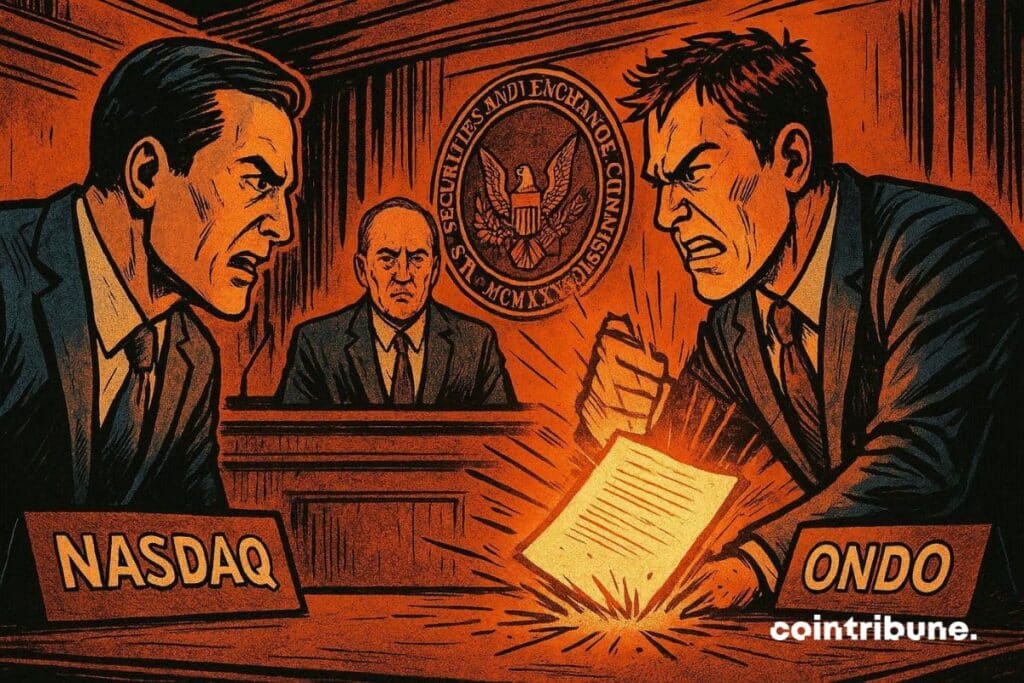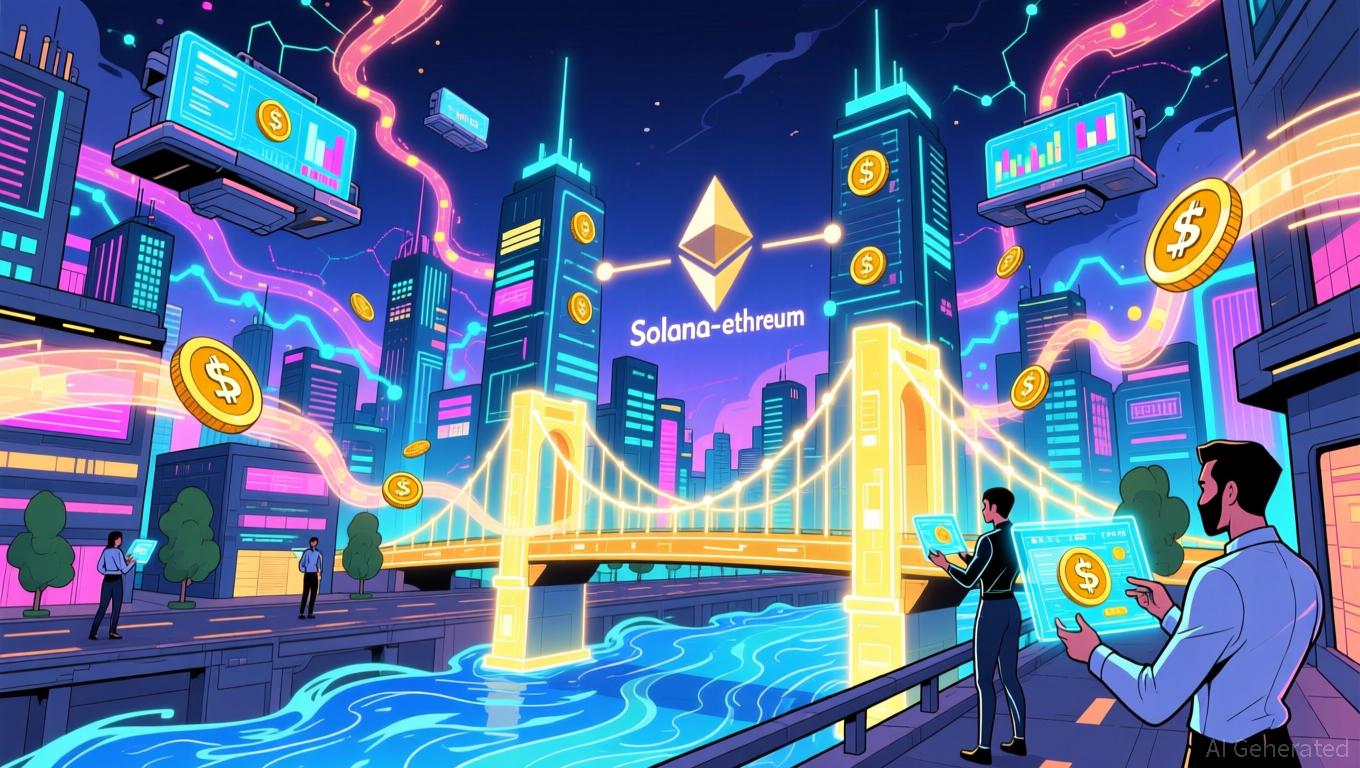Nasdaq Surges, Ondo Stalls: The Diverging Paths of Asset Tokenization
The tokenization of financial assets promises to disrupt traditional finance, but tensions between innovation and regulation are reaching a critical point. Nasdaq wants to accelerate the adoption of tokenized securities, while Ondo Finance, a giant in the sector, demands more transparency. Who is right in this fight for the future of crypto markets?

In brief
- Nasdaq proposes integrating tokenized securities to modernize markets, but its lack of details on the settlement process raises criticism.
- Ondo Finance demands more transparency from Nasdaq, denouncing an unfair competitive advantage and a risk of market centralization.
- The SEC’s decision could shape the future of tokenization, between accelerated adoption or stricter regulatory framework to protect investors.
Nasdaq’s Proposal for Tokenization of Securities
Nasdaq submitted a proposal to the SEC to integrate tokenized securities , a major step to modernize financial markets. The goal? Allow investors to trade stocks and ETFs in token form, reducing costs and speeding up transactions. According to Nasdaq, this innovation could democratize access to financial assets while maintaining traditional protections.
However, questions remain. The proposal relies on the Depository Trust Company (DTC) for transaction settlement, but technical details remain unclear. Some experts fear increased centralization, where a few players would dominate the market. In its letter to the SEC, Nasdaq assures that its approach complies with existing rules. But critics like Ondo Finance have doubts.
Ondo Finance Sounds the Alarm: Transparency and Fairness in Question
Ondo Finance, a leader in real asset tokenization, has sent a letter to the SEC to demand more clarity on Nasdaq’s proposal . According to Ondo, the lack of public details on DTC’s role creates an imbalance: only a few players would have access to crucial information, distorting competition. The company advocates for open collaboration and transparent standards before any approval.
 ONDO Finance writes to the SEC.
ONDO Finance writes to the SEC.
This opposition is not surprising. Ondo, which manages over 600 million dollars in tokenized assets, defends a decentralized and accessible ecosystem. For them, Nasdaq’s rush could harm the entire sector. Other players, like BlackRock and Fidelity, are watching closely, aware that this decision could influence their own tokenization projects.
Asset Tokenization: Toward a Stricter Regulatory Framework or a Financial Wild West?
The SEC plays a key role in this debate. Its approach will determine whether the tokenization of securities will be strictly regulated or left to private actors’ initiative. A too rapid approval could open the door to abuses, while a rejection would slow down innovation. While European regulators like the AMF in France adopt a cautious stance on tokenizing traditional assets by demanding strengthened guarantees, bitcoin reminds us that decentralization remains the only model resistant to any institutional interference.
Several scenarios are possible. If the SEC approves Nasdaq’s proposal, other exchanges could follow, accelerating global adoption. Conversely, a rejection or major modifications could slow the movement, favoring more decentralized solutions, like those promoted by Ondo Finance. Tokenization is inevitable, but its future will depend on the ability to find a balance between innovation and investor protection.
The confrontation between Ondo Finance and Nasdaq illustrates the challenges of tokenization: innovating without sacrificing transparency. However, one question remains: will tomorrow’s finance be more open or controlled by a handful of players? And you, would you be ready to invest in tokenized securities without clear guarantees?
Disclaimer: The content of this article solely reflects the author's opinion and does not represent the platform in any capacity. This article is not intended to serve as a reference for making investment decisions.
You may also like
Bitcoin Updates: Bitcoin Faces 23.6 Fib Level—Could Past Trends Spark an Altcoin Recovery?
- Bitcoin dominance fell to 59% at the 23.6 Fibonacci level, signaling potential altcoin rotation amid ETF outflows and price declines. - Corporate Bitcoin accumulation grows, with Hyperscale Data holding $70.5M in Bitcoin (77% of market cap) and Bitfarms holding $156M in Bitcoin. - Analysts highlight macroeconomic pressures and regulatory uncertainty as constraints on altcoin growth despite technical indicators suggesting capital rotation. - Market focus remains on Bitcoin stabilization above $80,000 and

Interoperability Fuels DeFi’s Evolution as Hemi and LI.Fi Connect Blockchains
- Hemi and LI.Fi expanded crosschain interoperability by integrating LI.Fi's bridge and swap API, enabling seamless token transfers across EVM and non-EVM networks like Solana . - Users can now transfer assets like USDC between chains in single transactions using routing tools, reducing friction for DeFi participants and developers. - The partnership standardizes crosschain workflows, eliminating fragmented bridge solutions while supporting liquidity aggregation across EVM, Solana, and alt-VMs. - By stream

Vitalik Buterin's Latest Support for ZK Technology and What It Means for the Cryptocurrency Industry
- Vitalik Buterin is driving a blockchain shift via ZK tech, enhancing Ethereum's scalability and privacy. - ZK infrastructure's $28B TVL surge highlights projects like zkSync Era and StarkNet boosting DeFi and gaming. - Investors target EVM-compatible ZK rollups and privacy toolkits, aligning with Ethereum's ZK roadmap.

XRP News Today: IMF Cautions That Tokenized Markets Could Face Collapse Without International Cooperation
- IMF warns tokenized markets risk destabilizing flash crashes due to rapid growth and interconnected smart contracts. - XRP highlighted as potential cross-border payment solution but not endorsed, alongside Stellar and Bitcoin-Lightning hybrid models. - Global regulators intensify oversight of tokenized assets, with ESMA, SEC, and central banks addressing governance and liquidity risks. - IMF stresses urgent need for coordinated policy frameworks to prevent fragmentation and systemic vulnerabilities in ev

